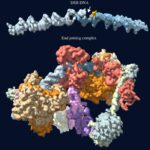Link to Pubmed [PMID] – 27548034
Link to HAL – Click here
Link to DOI – 10.1097/CJI.0000000000000137
J. Immunother. 2016 10;39(8):316-20
Several human papilloma viruses (HPV) are known to cause malignant transformation. The high-risk type HPV 16 is associated with cervical carcinoma and head and neck squamous cell carcinoma. HPV 16-positive tumor cells exclusively carry the HPV 16 oncogenes E6 and E7. These oncogenes appear as excellent targets for an adoptive immunotherapy. We here addressed the question whether specific T cells from HPV-vaccinated healthy volunteers could be especially suitable for an HPV-specific cellular immunotherapy. Of note, vaccines contain HPV 16. To quantify HPV 16 E6-specific and E7-specific cells, enzyme-linked immunospot assays to measure interferon-γ (IFN-γ) and interleukin-10 (Th1-Th2 balance) and the secretion of the cytotoxic molecules granzyme B and perforin have been optimized. The frequency of peripheral blood mononuclear cells secreting IFN-γ and perforin was significantly (P<0.05) increased in HPV-vaccinated versus nonvaccinated volunteers. Overall, however, the median frequency of HPV 16-specific cells with a favorable secretion profile (Th1 balanced and cytotoxic) was low even in vaccinated volunteers (IFN-γ: 0.0018% and 0.0023%, perforin: 0.01% and 0.0087% for E6-specific and E7-specific cells, respectively). But some vaccinated volunteers showed up to 0.1% HPV-specific, IFN-γ or perforin-secreting cells. In conclusion, our data suggest that vaccinated volunteers are superior to nonvaccinated donors for HPV-specific cellular cancer immunotherapy.


